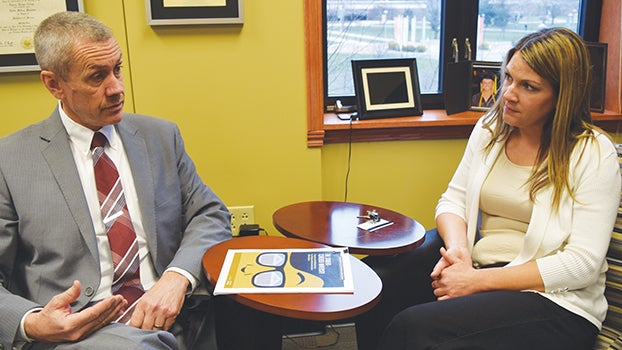United Way presents SMC with grant funding
Published 8:27 am Monday, May 21, 2018

- SMC President David Mathews talks to Candyce Buysse after SMC was awarded a grant from United Way. (Submitted photo)
DOWAGIAC — United Way of Southwest Michigan awarded Southwestern Michigan College a three-year, $25,000 per year grant to continue providing counseling services to students. Teens are more aware of issues with anxiety and depression and are seeking help — not just at SMC, but at colleges nationwide.
SMC identified the need through a pilot program utilized 75 times during the 2016-2017 academic year and sought funding for expanding the services going forward. SMC tries to identify any factors that might interrupt a student’s successful path to graduation and intervene where possible, officials said. Early intervention is a priority because a mental health issue is one of the top reasons students leave college.
A prior $20,000 United Way grant enabled SMC to provide counseling services during the 2017-18 academic year, addressing the reality that college life anywhere can be stressful with learning to balance classes, tests, projects, extra-curricular activities and work obligations. Not every student arrives with the necessary discipline and time-management skills to adjust daily routines, sleep and eating habits while removed from previous social-support networks. To the overwhelmed, dropping out can seem like a solution, but can actually compound problems.
Between 2009-15, the number of students visiting counseling centers nationwide increased 30 percent on average, while enrollment grew by less than 6 percent, a 2015 report by the Center for Collegiate Mental Health found. In the spring of 2017, 61 percent of students reported feeling “overwhelming anxiety” in the prior year, according to an American College Health Association survey of more than 63,000 students at 92 schools.
“In the first four months, the program positively impacted student retention rates by almost 25 percent,” Berrien County Council for Children Executive Director Jamie Rossow said presenting a United Way Excellence in Impact Award March 16, 2017, at the Mendel Center near Benton Harbor.
“United Way sees the need for it,” said SMC Chief of Staff Tom Atkinson, who serves on the agency’s 18-member Cass and Berrien counties board. “A three-year renewal is a strong vote of confidence.”
“The previous grant funded 12 hours per week. The new grant will now provide at least 15,” according to Lyndon Parrish, SMC director of security and conduct.
Candyce Buysse starts her second year this fall providing the counseling.
“Younger people are more apt to seek help,” Buysse said. “They’re more open to talking about their problems. My parents’ generation was like, ‘That’s life, deal with it and push through.’ But teens and twentysomethings deal with different problems than they had. In all fairness, we went to school without having to go through metal detectors. Kids now, that has been part of their daily lives.
“Social media plays a big part in making people more open to talking about what’s bothering them. A lot of students who come to see me have done a lot of research on the internet and self-diagnosed. They try and find a reason for what they’re experiencing. They may think they’re clinically depressed, but are experiencing negative emotions going through a break-up, for example. I serve as someone to talk with and figure out how to get through their situation and know they’ll be okay so they can get up and go to class. It’s a positive academically.
“Sometimes it’s just normal developmental transitions, such as social anxiety moving from a small town where you knew everybody to a campus where you don’t, and you’re an hour away from home. That situation is normal, but students may not know that’s normal. Others struggle with regulating emotions in a healthy way, not harming themselves or engaging in unhealthy behaviors. I’ve heard a number of roommate stories, too. All kinds of issues get brought to me for short-term ‘triage.’ If they need ongoing psychiatric care, I refer them to someone who can provide long-term oversight.
Sometimes one session is sufficient, she said, though that is not always the case.
“Others are dealing with something that happened in their life before they came to campus that still affects them today. They may see me a few times,” said Buysse, who spends two days a week on campus. The grant will enable services to be extended to the Niles Campus in addition to Dowagiac.
“Seeing a therapist on campus feels safe to them,” Buysse said. “This is school, where their friends are, where they live. I get referrals from faculty, housing, staff, peers, but the highest response is from students who refer themselves.”
Southwestern Michigan College is a public, residential and commuter community college founded in 1964. The college delivers above-average graduation/transfer rates compared to other community colleges nationally and student college-level course success that is consistently in the top 25 percent of two-year colleges nationally. SMC strives to be the college of first choice, to provide the programs and services that meet the needs of students and to serve our community, according to officials. The college is accredited by The Higher Learning Commission of the North Central Association of Colleges and Schools and is a member of the American Association of Community Colleges.
Learn more at swmich.edu or email mediarelations@swmich.edu.






